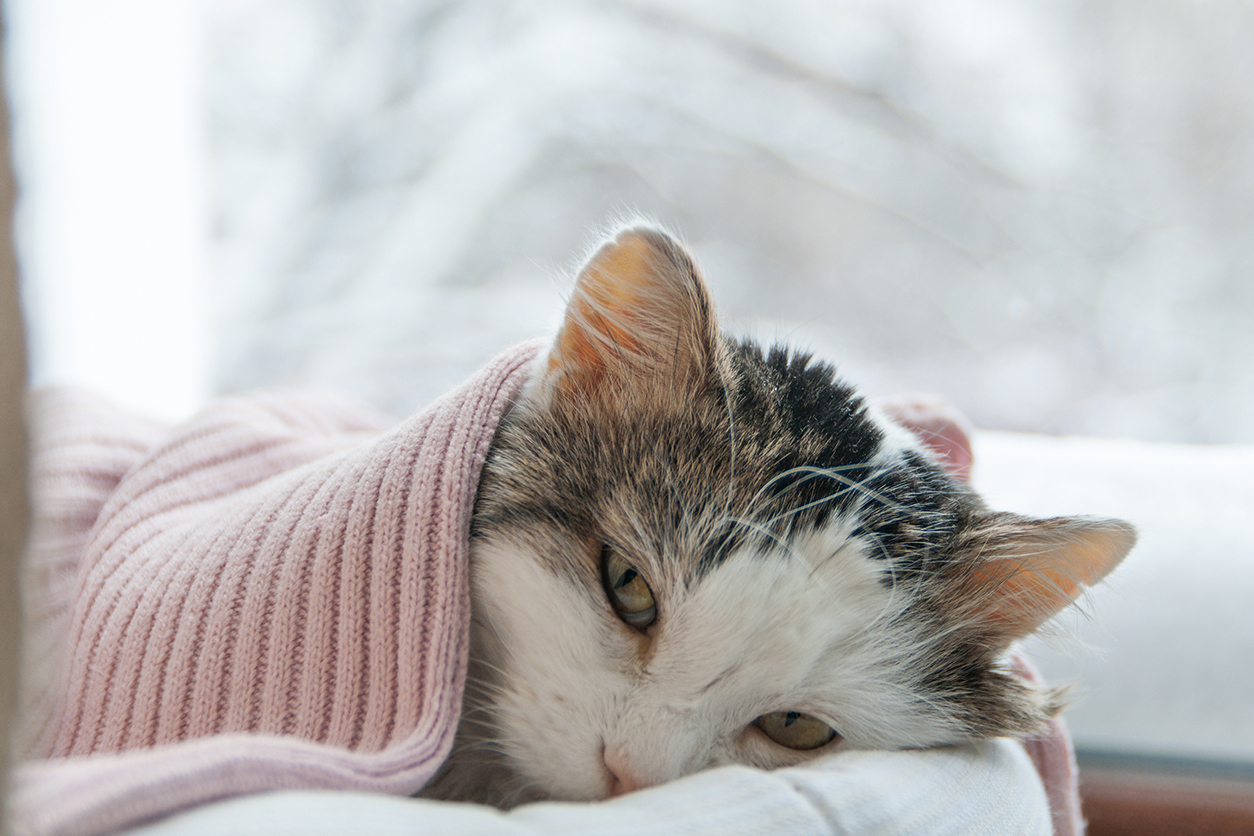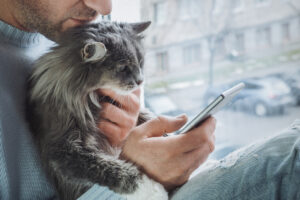Feline Infectious Peritonitis (FIP) has been regarded as a scary and often deadly disease for cats, worrying cat parents everywhere, but there’s good news. Recent progress in veterinary medicine has brought new hope for both cat owners and their companions dealing with FIP.
We will take a look at advancements in treatment for FIP, including the serendipitous discovery of molnupiravir, a drug which was initially used to treat COVID-19 in humans, and how this marked a significant breakthrough in feline medicine.
So, what is FIP?
FIP is caused by a mutated version of a common virus called Feline Enteric Coronavirus (FEC). Normally, this virus leads to mild gastrointestinal issues in cats that usually resolve on their own. But when it mutates and causes FIP, it becomes a serious and often fatal disease that affects many parts of the body. Dr. Kate Worthing (BVSc PhD PGCert) from the University of Sydney School of Veterinary Science explains, “while most cats with this virus don’t show any signs, or only have a bit of diarrhoea, a small number of them develop FIP.”
What are some signs that a cat may have FIP?
FIP can be tricky to diagnose because it can cause a variety of symptoms. Some of these symptoms can include:
- A potbellied appearance
- Persistent fever
- Loss of appetite
- Weight loss
- Lethargy
- Difficulty breathing
- Jaundice (yellowing of the eyes or gums)
- Eye abnormalities (such as inflammation or cloudiness)
- Neurological symptoms (such as seizures or imbalance)
Is there anything you can do to reduce your cat’s risk of getting FIP?
When we chatted to Dr. Kate Worthing, we asked about ways to reduce the chances of a cat getting FIP. She explained that even though researchers are working hard on it, figuring out how FIP develops is still a bit of a mystery. It’s influenced by a range of factors, like a cat’s genetics, changes in the virus, and sometimes just luck. While we can’t control these factors directly, studies suggest that cats living with lots of other cats are more likely to get FIP than those in single-cat homes. So, having fewer cats might lower the risk. But because FIP is so complex and we don’t fully understand it yet, Dr. Kate Worthing stressed that there’s no guaranteed way to prevent it.
The serendipitous discovery of a new treatment
The search for a treatment for FIP got a boost from the worldwide effort to fight COVID-19, when new medications were discovered: remdesivir, GS441524 and molnupiravir. These were all originally designed to fight human viruses. As doctors worked on treating COVID-19 patients, they noticed similarities between how FIP affects cats and severe COVID-19 in humans. This got them thinking: could remdesivir, GS441524 and molnupiravir help cats with FIP too?
Dr. Kate Worthing points to a recent study [i] done by the University of Sydney that found some exciting results. In the study, 86% of cats diagnosed with FIP went into remission after being treated with either remdesivir, an antiviral drug given by injection, or GS-441524, a similar drug given orally. This breakthrough shows how treatments from one field of medicine can be adapted to help with diseases in another, giving us hope for fighting illnesses that affect both humans and animals.
Which breeds are most affected by FIP?
According to PetSure data*, the following breeds of cats were most affected by FIP:
- Devon Rex
- Exotic Short Hair
- British Short Hair
- Birman
- Siberian
“In 2023, among our insured cats, we noticed over 100* claims for FIP, with multiple claims including ongoing treatment per affected cat. It also seems that males and certain breeds are more prone to getting infected than females.” – Dr. Kylie Mitchell
Providing care and managing nutrition
Alongside treatment, giving supportive care and managing nutrition are crucial for cats with FIP. Supportive care includes giving them Intravenous fluids (IV) to keep them hydrated, feeding them a balanced diet to fight weight loss and malnutrition, or treating symptoms like fever and lethargy when necessary.
Does pet insurance cover treatments for FIP?
PetSure’s pet insurance policies now include coverage for antiviral medications like remdesivir and GS-441524, as well as molnupiravir. This means pet parents have more options to help their cats fight FIP and can focus on giving them the best care possible.
A case study: Tezy’s bout with FIP
Luke and his partner Analee are the proud pet parents to Tezy – a two-year-old black Domestic Shorthair they rescued in February 2021. Tezy is a playful, affectionate, and vocal cat but after they introduced a new rescue cat to the home, Willow, they knew something wasn’t quite right.
In June 2023, Tezy became lethargic and reclusive and started hiding away in a box. After noticing Tezy’s loss of appetite and that she was struggling to jump with a limp in the back leg, Luke took her straight to the local vet for examination. The vet noticed fluid in Tezy’s abdomen and suspected the fluid was urine leaking out of her bladder and referred Tezy to the emergency vet hospital at the University of Sydney. Here, the specialist did a range of X-rays and blood tests and after three days of observation, they diagnosed Tezy with feline infectious peritonitis (FIP).
Having not heard of FIP before, the veterinary specialist explained that while FIP was previously a fatal disease it could now be treated effectively, thanks to new research and a breakthrough during the Covid-19 pandemic that discovered the application of new medications for FIP. However, Luke was warned that the medications were costly.
Tezy’s treatment included a combination of GS-441524 (oral tablet) and Mefloquine (an anti-malarial that has better blood-brain penetration than GS tablets) to help with Tezy’s neurological symptoms, including her limp. Tezy remained in hospital for 1 week in total and the treatment went on for three months. The total claim cost was $18,471, so Luke was thankful he had pet insurance as he was reimbursed $14,339, nearly 80% of the eligible treatment cost. This meant Luke was only out-of-pocket around $4,000.
“There’s no value on a cat’s life but if I didn’t have pet insurance, we wouldn’t have been able to afford treatment and Tezy may not be with us today,” – Luke
Luke’s advice to other pet parents is to go to the vet right away if you notice something isn’t right, and to look out for warning signs like a reduced appetite, lethargy, or weight loss. He also urges pet parents to get a second opinion if needed and to do the research, stating there are great online resources and community groups with useful information.
While Tezy’s recovery was gradual, Luke saw a noticeable difference in her demeanor as soon as treatment started. Tezy has been in stable remission since September 2023, and is back to her usual energetic and affectionate self – playing at home with her brother Willow, while still maintaining her independence.
An FIP diagnosis can be tough for pet owners, but there’s some good news. Advancements in veterinary medicine has offered new hope for cats affected by FIP. While these treatments might not cure the disease, they can help cats live longer and have a better quality of life.
*PetSure claims data for 2023, considering breeds with a policy count of at least 500 pets.
Testimonials and customer experience may vary depending on individual circumstances. Claims are assessed subject to policy terms and conditions.

References
Chan, B. (2024). PHM 2024: FIP Article Questions with Dr. Betty Chan. PetSure. 8 Feb.
Mitchell, K. (2024). PHM 2024: FIP Article Questions with Dr. Kylie Mitchell. PetSure. 14 Feb.
Worthing, K. (2024). PHM 2024: FIP Article Questions with Dr. Kate Worthing BVSc PhD PGCert. PetSure. 15 Feb.
Roberts, D.M. (2023). FIP CPD with Madeleine Roberts. BVSc (Hons) FANZCVS Specialist in Small Animal Medicine. 19 Jul.
International Cat Care (2023). Feline Infectious Peritonitis (FIP) (feline coronavirus). [online] https://icatcare.org/. Available at: Feline Infectious Peritonitis (FIP) | International Cat Care (icatcare.org) [Accessed 30 Jan. 2024].
College of Veterinary Medicine (n.d.). Feline Coronavirus (FCoV) RT-PCR. [online] www.vet.cornell.edu. Available at: https://www.vet.cornell.edu/animal-health-diagnostic-center/veterinary-support/disease-information/feline-coronavirus [Accessed 30 Jan. 2024].
FIP Cats Australia (n.d.). FIP is Treatable. [online] FIP Cats Australia. Available at: https://fipcatsaustralia.org.au/ [Accessed 8 Feb. 2024].
Feline infectious peritonitis: answers to frequently asked questions concerning FIP and coronavirus https://www.ncbi.nlm.nih.gov/pmc/articles/PMC7147232/
Unlicensed Molnupiravir is an Effective Rescue Treatment Following Failure of Unlicensed GS-441524-like Therapy for Cats with Suspected Feline Infectious Peritonitis https://www.ncbi.nlm.nih.gov/pmc/articles/PMC9612227
Diane D. Addie, PhD, BVMS, MRCVS (2019). Feline infectious peritonitis: answers to frequently asked questions concerning FIP and coronavirus. [online] National Library of Medicine. Available at: https://www.ncbi.nlm.nih.gov/pmc/articles/PMC7147232/ [Accessed 14 Feb. 2024].
Pet insurance can help by covering a portion of the eligible vet bill if the unexpected happens. Because it is difficult to predict the costs of veterinary care, it can help to have measures in place to help prepare for the unexpected. Check out our partner network and explore our policy tools to find a pet insurance policy.
Not all conditions or items are covered by Pet Insurance. Refer to the applicable Product Disclosure Statement for information about coverage and exclusions.








